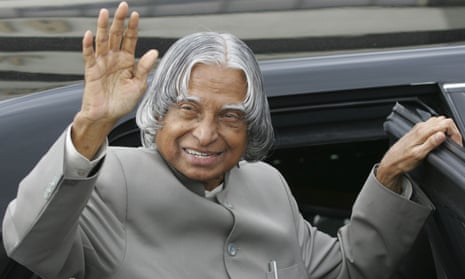Former Indian president APJ Abdul Kalam, known as the father of the country’s military missile program, died on Monday after collapsing while delivering a lecture, a top state official said. He was 83.
The president from 2002 until 2007, he was a scientist and science administrator for four decades before that, mainly at the state-run Defense Research and Development Organisation and the Indian Space Research Organisation. He played a key organisational and technical role in India’s nuclear program.
He also served as a scientific adviser to the prime minister.
Kalam fell sick on Monday while addressing the students of the Indian Institute of Management in the Meghalaya state capital, Shillong, said PB Warjri, chief secretary of the state. He was rushed to the hospital, but was declared dead after doctors could not revive him, Warjri said.
The federal government would declare national mourning for seven days for him, said federal home secretary LC Goyal.
Kalam’s body will be flown to New Delhi on Tuesday for burial.
India’s president Pranab Mukherjee said “Kalam would be long remembered for his passion for science and innovation and his contribution as an eminent scientist, administrator, educationist and writer.”
The prime minister, Narendra Modi, said “his death is a great loss to the scientific community. He took India to great heights. He showed the way.”
“He was an inspiration to an entire generation,” home minister Rajnath Singh tweeted.
Sonia Gandhi, the president of the opposition Congress party, described Kalam as “one of the greatest scientific minds, a scholar statesman and a true patriot who inspired millions of young and old alike by his works and deeds”.
After his presidential term ended, Kalam traveled to remote schools and colleges, speaking to students and inspiring them to follow their dreams.
Even after he left office, he received hundreds of emails each day from high-school students and other young people seeking his advice. He would reply to most of the children who wrote to him.
Kalam received several prestigious awards, including Bharat Ratna, India’s top civil honor conferred by the government.
He played a crucial role when India tested its nuclear weapons in 1998.
He also authored several books, notably Wings of Fire, India 2020 and Ignited Minds.
Kalam had a humble beginning. His father owned boats which he rented out to local fishermen. Kalam used to describe himself as “Made in India,” as he never trained abroad.

Comments (…)
Sign in or create your Guardian account to join the discussion